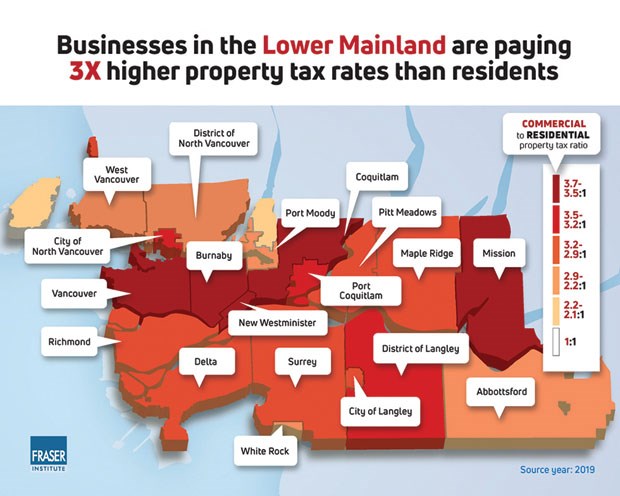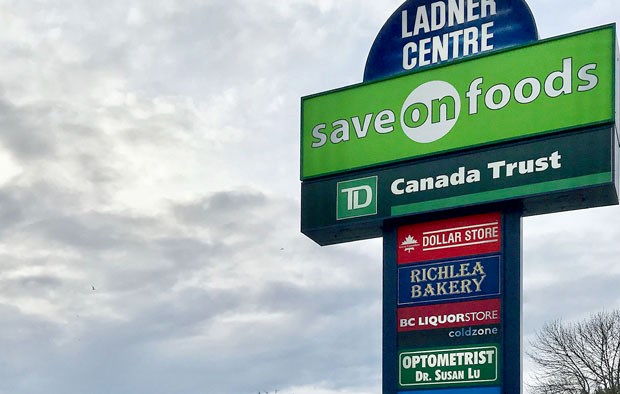The City of Delta is putting the final touches on its 2020 tax bill that will once again see the business sector, from retail to industry, shoulder a disproportionate share of the burden.
Although city hall has taken steps to shift the ratio in an bid to lighten that load, businesses are becoming more and more vocal about the negative impact property taxes are having on their viability.
City manager Sean McGill said Delta reviewed the issue four years ago when the Canadian Federation of Independent Business raised concerns. At that time McGill said business had been paying around 3.36 times more than residential, a figure that’s decreased to just over three times.
The issue was also recently raised in a Fraser Institute report, Who Bears the Burden of Property Taxes in Canada’s Largest Metropolitan Areas? That report shows a business pays anywhere from double to four times as much in property taxes as a like-valued residential property in the Lower Mainland. At 3.04, Delta is just below the 3.15 average in that regard.
The report also shows light industry pays double to five times depending on the jurisdiction (Delta is at 2.96, which is below the regional average of 3.88), while major industry pays triple to 20 times as much as residential (Delta is at 11, above the 8.14 regional average).

Not only are property tax rates considerably higher for business than they are for residential, but rising assessments, in some instances based on future use for a property, are creating a double whammy that many are finding hard to overcome.
Randy Scott, owner of Randy’s Excel Tire & Auto Service in Tsawwassen, said he has no problem paying his fair share of property taxes, but thinks most people don’t realize the significant impact the tax situation has had on small businesses.
“We’re in the middle between B.C. Assessment’s assessment process and the city’s planning and tax process. There’s got to be a way to find a solution for those of us who are long-term businesses so that we can afford to keep operating,” Scott said.

Rob Gillespie of Muscle Memory Studio in Tsawwassen said that as a property owner and a small business owner, he’s felt the effects on both fronts.
“For my business, Muscle Memory, my property tax doubled overnight three years ago because of the change in assessment for the property. As a landlord I’ve noticed the negative impact this has had on my tenants as well, which is frustrating because I want my tenants to stay here and be successful in a competitive environment,” said Gillespie.
Given property taxes are essentially fees for service to provide everything from police and fire protection to parks and recreation amenities, many in the business community don’t see the justification for local governments to charge one class of property more tax than another, particularly when the business sector typically consumes less of those civic services.
The Fraser Institute report states a growing body of academic literature argues that local governments face incentives to minimize taxation on groups most likely to vote in local elections, most notably homeowners, while shifting more of the tax burden onto groups that are less likely or unable to vote, such as businesses.
According to the B.C. Chamber of Commerce, industrial taxpayers substantially subsidize the residential tax base. For every $1 paid in taxes, it says industrial lands typically receive, on average, only 25 cents in services.
Delta Chamber of Commerce executive director Garry Shearer said B.C. Assessment’s policy of assessing properties on their “highest and best use” for potential future redevelopment has created a challenging situation for a property owner who doesn’t have the available capital to re-develop their property.
“These situations can force property owners to either sell their properties to outside investors who do have the capital to wait out the development process or to pass along the increased costs to their small business commercial tenants through their triple-net lease rates,” Shearer said.

Lydia Elder, who recently joined the Delta Chamber of Commerce to lead its advocacy initiatives after five years as the executive director of the Tsawwassen Business Improvement Association, agreed, saying the highest and best use assessment has been causing significant harm to small businesses in many municipalities.
“Enormous increases in assessed value on the theoretical future development of properties which may one day be redeveloped cause the tax rates for commercial properties to increase dramatically, and therefore puts the property owner in a situation where they have to either pass that cost along to their tenant, resulting in increases to their lease rates, or forces them to sell the property to someone who can afford to pay the increased tax rates and wait out the development process. This has been happening for years in places like Vancouver, but we’ve only recently started to see the effects here in Delta,” she told the Optimist.
She said the Tsawwassen Business Improvement Association last year wrote to the city to convey its concern and the city subsequently put forward a motion at the Union of B.C. Municipalities convention.
That resolution asked the province “to undertake a review of the highest and best use valuation methodology and develop measures to effectively minimize the impact that this approach is having on small businesses in Metro Vancouver.”
Shearer said speculation on industrial land, the supply of which is rapidly shrinking, and farmland is also driving the values and assessments higher each year. He also noted the resistance to densification in residential areas is putting pressures on available land to meet housing demands.

“If planned and managed accordingly, more infill residences will produce greater total residential tax revenue within the same area, without increasing rates, and therefore reduce the burden on the community as a whole.”
Liberal MLA Todd Stone, the official Opposition critic for municipal affairs and housing, has again called for the NDP government to immediately implement legislation that will enable local governments to allow for split-zoning, saying it’s needed before more small businesses are forced to close their doors due to skyrocketing property taxes.
“This past fall I introduced legislation that would provide tax relief to small businesses who are currently struggling to make ends meet as they are being forced to pay a tax on the unused airspace above their heads,” said Stone. “Minister (Selina) Robinson promised to implement short-term solutions last fall, yet nearly three months later we have not heard anything even close to a plan from her.”
The Liberals note the Canadian Federation of Independent Business released a recent report that calls for immediate action from the province. The CFIB estimates the average small business owner in Metro Vancouver saw their property assessment increase 87 per cent in the last five years.



